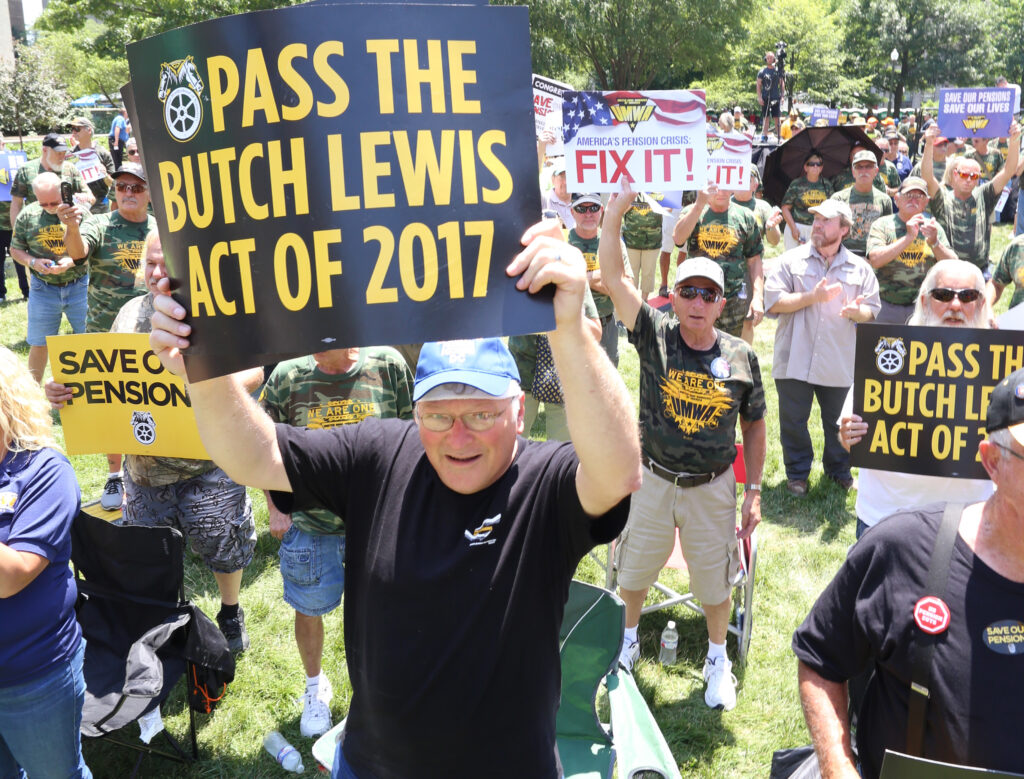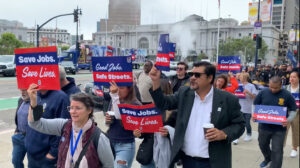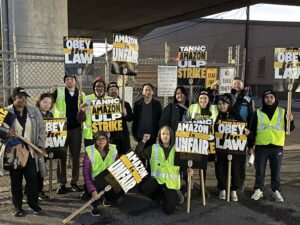Elections have consequences; this time they’re good
March 18, 2021
As nearly 6,000 workers at an Amazon warehouse in Alabama are voting in a union representation election, on February 28, President Biden released a remarkable video statement supporting the right of workers to join unions — perhaps the most forceful support of unions from a U.S. President in nearly a century.
“I have long said that America wasn’t built by Wall Street; it was built by the middle class…and unions built the middle class. Unions put power in the hands of workers. They level the playing field,” Biden said in the opening to his two-minute statement. “They give you a stronger voice for your health, your safety, higher wages, protection from racial discrimination and sexual harassment. Unions lift up workers, both union and non-union and especially black and brown workers.”
The statement asserted that the National Labor Relations Act is about encouraging unions, not just tolerating them. “Every worker should have a free and fair choice to join a union. The law guarantees that choice. And it’s your right… No employer can take that right away.”
In response, Joint Council 7 President Rome Aloise stated in a letter to Biden, “For the last 46 years I have been organizing and negotiating for workers and union members, and your video—the frankness, the honesty, the total commitment and sincerity of your words, actually brought tears to my eyes. I never thought I would see a President of the United States make such a bold and honest statement to workers about the value of union representation.”
So far, Biden is backing up his words with action. From leadership appointments to overturning Trump anti-union executive orders to the $1.9 trillion American Rescue Plan, the Biden administration has been busy restoring calm and caring to the agencies that oversee working conditions and unions, and providing the funds to keep cities and states solvent, providing direct payments to struggling workers, bolstering union pension plans, and extending unemployment insurance.
Key agency appointments
On Day One in office, Biden fired Trump’s anti-union NLRB General Counsel Peter Robb, a move widely applauded by unions. In his place, Biden appointed Peter Sung Ohr to serve as Acting NLRB General Counsel. Ohr was a regional director for the NLRB and has a long history of pro-worker decisions. He took immediate action to overturn some of Robb’s anti-union decisions.
Biden quickly picked Jennifer Abruzzo to take the permanent position, which needs Senate approval. She has a long history of working for the Labor Board and for unions.
In a novel move, Biden appointed a labor leader to lead the Department of Labor—Marty Walsh, the Mayor of Boston. Walsh previously led a Laborers union local and headed up the Boston Metropolitan District Building Trades Council.
Biden selected a Steelworker to lead OSHA and named the former head of the Minnesota Building Trades Council to head up the Wage and Hour Division. He has also made new appointments at the Equal Employment Opportunity Commission, the Federal Labor Relations Authority, and other agencies.
Unlike in the previous administration, none of these appointees are determined to dismantle the agencies they are charged with leading.
Strengthening laws that protect workers
For the first time, after a year-long fight by unions, OSHA was ordered to create a COVID safety standard. This will not only create a uniform standard for safety during COVID, but it will also allow workers a new avenue to protect themselves from bosses who refuse to put proper safety procedures in place. He also instituted a federal mask mandate for everyone involved in interstate travel.
Other immediate changes that Biden instituted by Executive Order include:
strengthening the federal government’s Buy American Provisions;
implementing a $15 minimum wage for federal contractors;
reinstating federal diversity and inclusion training;
allowing federal unions to bargain again;
enabling workers to refuse dangerous work and still qualify for unemployment insurance, such as with a COVID-19 outbreak.
These are just some of the advances President Biden made in his first month in office. While it is a good start, Biden has a lot more on his agenda to be completed over the next 47 months, including a major infrastructure project, a minimum wage hike, and the passage of the Protect the Right to Organize (PRO) Act, which will both expand workers’ rights on the job and protect the right of workers to choose union representation.
COVID stimulus saves pension plans
Included in the $1.9 trillion COVID stimulus plan is the Butch Lewis Emergency Pension Plan Relief Act of 2021. Unions have fought for several years to pass this very pension fix but were blocked by then-Senate Majority Leader Mitch McConnell (R-KY). This bill will go far to strengthen troubled union pension plans, including the Central States Teamster plan, ensuring that millions of retirees and active Teamsters will receive the pension benefits they earned through years of hard work.
“This legislation will address the multi-employer pension crisis by providing a lifeline to plans in critical financial status … without cutting the earned benefit promises made to our nation’s retirees and working families,” said Aloise, who serves as a Trustee on the Western States Pension plan, which is currently in strong shape. “We were afraid that the weak plans could bring down the whole system,” he adds, “Now we have some room to breathe.”





